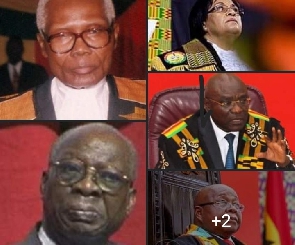 Collage of former speakers of Parliament
Collage of former speakers of Parliament
The Parliament of Ghana over the weekend omitted the name and image of the 3rd Speaker of the 4th Republic, Rt. Hon. Ebenezer Begyina Sekyi-Hughes, from a Facebook post commemorating the 30th anniversary of the 4th Republic.
Parliament was marking 30 years since Ghana’s fourth Republican Parliament was inaugurated after 11 years of military rule when a new constitution was approved in a 1992 referendum.
Listing the current and former Speakers of Parliament, Parliament started with the late Justice D.F Annan, went to Peter Ala Adjetey, and skipped Sekyi-Hughes to Justice Joyce Bamford Addo then Doe Adjaho, Prof Aaron Mike Oquaye before ending with current Speaker Alban S.K Bagbin.
After being prompted through a comment, Parliament said it was an error and rectified it.
“Krobea Kwabena Asante thanks for printing [sic] that out. It was inadvertent. Rectified,” the page admin said.
Parliament of Ghana gave a background to the current composition of Parliament.
Find Parliament’s Constitution Day Post:
Ghana returned to constitutional rule on 7th January 1993. The first Parliament of the fourth Republic was dominated by the National Democratic Congress (NDC) who won 189 out of 200 seats in Parliament. It included 16 women.
Over the years the number of seats have increased to 230 seats in 2006 and 275 in 2013.
The current Parliament, which is the 8th of the fourth Republic introduced some interesting dynamics in democratic governance. The two major political parties for the first time holding the same number of seats and the resulting elements of a hung Parliament.
At the inauguration of the 8th Parliament, the New Patriotic Party (NPP) had 137 seats, the National Democratic Congress (NDC) had 137 seats with one independent member.
Of the 275 members, 40 are women which is the highest number of female representation yet. It is also the first time the Speaker of Parliament has no political ties with the party of the executive government.
This shows how far our democracy has come since 1993. Citizens have become more informed and discerning, and are taking active part in governance and constitutional matters.
Since the fourth Republic, Parliament has enacted over 1000 Bills including the Right to Information Act, National Identification Authority Act, Interpretation Act, Food and Drugs Act, the Private Members Bill of 2020 just to mention a few and the repealing of others such as the Criminal Libel law. There are still many more Bills to be passed.
This 30 year mile stone will be celebrated throughout the year with various activities and events